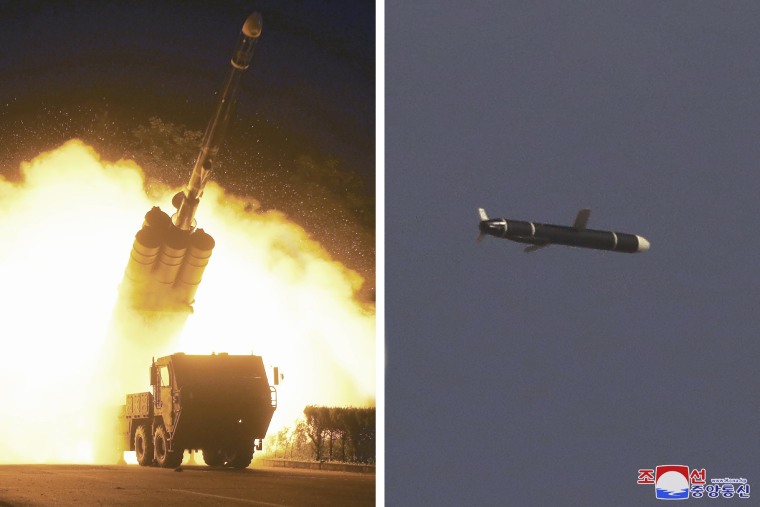SEOUL, South Korea — North Korea carried out successful tests of a new long-range cruise missile over the weekend, state media said on Monday, seen by analysts as possibly the country's first such weapon with a nuclear capability.
The missiles are "a strategic weapon of great significance" and flew 930 miles before hitting their targets and falling into the country's territorial waters during the tests on Saturday and Sunday, KCNA said.
The latest test highlighted steady progress in Pyongyang's weapons program amid an impasse in talks aimed at dismantling the North's nuclear and ballistic missile programs in return for U.S. sanctions relief. The talks have stalled since 2019.
North Korea's cruise missiles usually generate less interest than ballistic missiles because they are not explicitly banned under United Nations Security Council resolutions.

"This would be the first cruise missile in North Korea to be explicitly designated a 'strategic' role," said Ankit Panda, a senior fellow at the U.S.-based Carnegie Endowment for International Peace. "This is a common euphemism for nuclear-capable system."
It is unclear whether North Korea has mastered the technology needed to build warheads small enough to be carried on a cruise missile, but leader Kim Jong Un said this year that developing smaller bombs is a top goal.
North Korea and South Korea have been locked in an accelerating arms race that analysts fear will leave the region littered with powerful new missiles.
South Korea's military did not disclose whether it had detected the North's latest tests, but said on Monday that it was conducting a detailed analysis in cooperation with the United States.
The U.S. military's Indo-Pacific Command said it was aware of the reports and was coordinating with its allies and partners.
Japanese Chief Cabinet Secretary Katsunobu Kato said that unlike ballistic missiles North Korea launched in 2017, the cruise missiles tested over the weekend did not fly over Japan.
But if the missile can fly as far as North Korea reported, he said, "it would be a major concern for us." Japan would continue to work closely with the U.S. and South Korea to collect, analyze and monitor North Korea's military activities, he said.
In China, a spokesman for the Foreign Ministry called on all parties to continue to pursue a political settlement “in accordance with the dual-track approach and the principle of phased and synchronized actions.”
Download the NBC News app for breaking news and politics
Rodong Sinmun, the official newspaper of North Korea's ruling Workers' Party, ran photos of the new cruise missile flying and being fired from a transporter-erector-launcher.
The test provides "strategic significance of possessing another effective deterrence means for more reliably guaranteeing the security of our state and strongly containing the military maneuvers of the hostile forces," KCNA said.
It was seen as the North's first missile launch after it tested a new tactical short-range ballistic missile in March. North Korea also conducted a cruise missile test just hours after U.S. President Joe Biden took office in late January.
The North Korean missile test followed last week's relative muted military parade, which focused on civil defense and the government’s efforts to combat the coronavirus pandemic rather than displaying menacing weapons.
While some analysts saw the parade as an attempt to make room for diplomatic negotiations, North Korea’s missile test “suggests it is more committed to a domestic timeline for military modernization than to any external timeframe for diplomacy,” Leif-Eric Easley, associate professor of international studies at Ewha Womans University in Seoul, said.
The unveiling of the test also came a day before chief nuclear negotiators from the United States, South Korea and Japan meet in Tokyo to explore ways to break the standoff with North Korea.
China's foreign minister, Wang Yi, is also scheduled to visit Seoul on Tuesday for talks with his counterpart, Chung Eui-yong.
Biden's administration has said it is open to diplomacy to achieve North Korea's denuclearization, but has shown no willingness to ease sanctions.
Sung Kim, the U.S. envoy for North Korea, said in August in Seoul that he was ready to meet with North Korean officials "anywhere, at any time."
The missile test might lead Kim, the U.S. envoy to North Korea, to shift his focus at that meeting “from offering humanitarian assistance to coordinating sanctions enforcement and missile defense cooperation,” Easley wrote in an email to NBC News.
A reactivation of inter-Korean hotlines in July raised hopes for a restart of the negotiations, but the North stopped answering calls as annual South Korea-U.S. military exercises began last month, which Pyongyang had warned could set off a security crisis.
